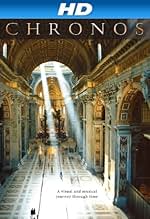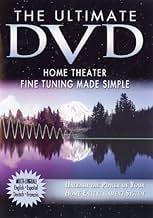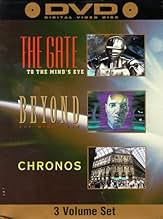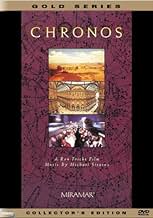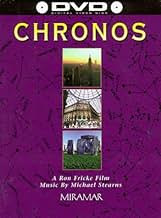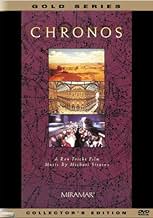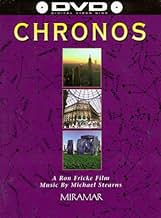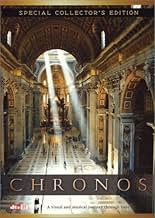Escenas cuidadosamente seleccionadas de la naturaleza y la civilización, se ven a alta velocidad, utilizando cinematografía de lapsos de tiempo, en un esfuerzo por mostrar la historia de var... Leer todoEscenas cuidadosamente seleccionadas de la naturaleza y la civilización, se ven a alta velocidad, utilizando cinematografía de lapsos de tiempo, en un esfuerzo por mostrar la historia de varias regiones.Escenas cuidadosamente seleccionadas de la naturaleza y la civilización, se ven a alta velocidad, utilizando cinematografía de lapsos de tiempo, en un esfuerzo por mostrar la historia de varias regiones.
- Dirección
- Guionistas
Opiniones destacadas
Chronos is an interesting movie, it doesn't have any conventional storyline, and no dialogue, it's just really gorgeous imagery and music, which surprisingly was a one long continuous track composed by Michael Stearns which ran throughout the entire movie. I really like how this film was shot, it's mostly Time-Lapse cinematography, which is just footage that is recorded for multiple hours at a time and then sped up to make it look ultra-cool, and the cinematography is just flat-out amazing, and with the locations that they capture, that makes it even better.
As I said in the summary of this review, you might want to slow your brain down before watching this movie, this isn't your typical documentary, like I've stated earlier, there's no dialogue in this film, which might make it a bit boring, I'd actually recommend listening to the commentary on the DVD and Blu-ray releases for this movie so you won't be bored to death, but nevertheless, this is an amazing visual experience, and the only reason I'm giving this a 9 is because it is a bit boring at times, and it's only 42 minutes long, other than that, I'd highly recommend "Chronos".
As I said in the summary of this review, you might want to slow your brain down before watching this movie, this isn't your typical documentary, like I've stated earlier, there's no dialogue in this film, which might make it a bit boring, I'd actually recommend listening to the commentary on the DVD and Blu-ray releases for this movie so you won't be bored to death, but nevertheless, this is an amazing visual experience, and the only reason I'm giving this a 9 is because it is a bit boring at times, and it's only 42 minutes long, other than that, I'd highly recommend "Chronos".
In Greek mythology, Chronos is said to be the personification of time. Taking that into consideration, you might assume that this would be the longest of the films that Ron Fricke was involved with but actually the opposite is true. Chronos comes in at just under 45 minutes making it a short but sweet trip around some of the world's most beautiful man-made and geological structures.
For those looking for a longer trip as well as more to think about when the film is over, I highly recommend Powaqqatsi at 99 mins, Baraka at 96 mins, and Koyaanisqatsi at 87 mins - but you should probably skip Naqoyqatsi at 89 mins because its the weakest of the Qatsi trilogy. Whereas Naqoyqatsi's seizure inducing mechanical/digital messages drench the experience, Chronos is the exact opposite.
Chronos is sort of a Baraka "lite". This does not have the music of Philip Glass or the socio-political messages, but the beauty on display should make up for it. Additionally Fricke experiments with different exposures and filters (not seen in the other films) to create some striking effects. If you get the chance to see it, definitely take this one for a spin.
Fricke has a new film coming out soon (should be sometime this year) called Samsara which is a sequel to Baraka, and if that doesn't fill the gap you can check out Anima Mundi (by Reggio about animals), Microcosmos (about insects) and Atlantis (by Luc Besson) which is like a scuba dive.
For those looking for a longer trip as well as more to think about when the film is over, I highly recommend Powaqqatsi at 99 mins, Baraka at 96 mins, and Koyaanisqatsi at 87 mins - but you should probably skip Naqoyqatsi at 89 mins because its the weakest of the Qatsi trilogy. Whereas Naqoyqatsi's seizure inducing mechanical/digital messages drench the experience, Chronos is the exact opposite.
Chronos is sort of a Baraka "lite". This does not have the music of Philip Glass or the socio-political messages, but the beauty on display should make up for it. Additionally Fricke experiments with different exposures and filters (not seen in the other films) to create some striking effects. If you get the chance to see it, definitely take this one for a spin.
Fricke has a new film coming out soon (should be sometime this year) called Samsara which is a sequel to Baraka, and if that doesn't fill the gap you can check out Anima Mundi (by Reggio about animals), Microcosmos (about insects) and Atlantis (by Luc Besson) which is like a scuba dive.
OK I just watched this movie as an attempt to retrace Ron Fricke's filmography. As I find Baraka to be probably the best of all of my all time favorites, I started to watch Chronos with a somehow pervert feeling : "that cannot be better that Baraka" ... In my opinion it's not, BUT I must immediately add that it's a different approach to the reality he shows us, and in its way it's a masterpiece.
-Clearly the "message" here is an attempt to make the spectator aware of the scale of time and its unstoppable pace, along with the fragility and futility of advanced societies if left ungoverned. It's a difficult challenge to make such a movie in terms of techniques it requires and storyline you may actually tell. On this level he has managed to weave it all perfectly well.
-The technical achievement of making a movie of this level of quality with a low budget, on so many locations, with such a high level of consistency in the takes is just MAD technically speaking.
-This was all made in 1985... It's JUST Unbelievable...
-The work Ficke has accomplished with the dynamics of the light is closer to painting than mere filming. Almost all takes have a profound and aesthetic composition, dealing in it's way with the moment of the storyline. So contrary to what some say, it's not JUST filming locations... There is a second level of composition in these frames. Everything is extremely well demonstrated at the last frame of the movie...
-I do not agree that there is no political meaning in this film. It is in my opinion on a parallel with Baraka. There's quite a large amount of Christianity in it, but I am sure that Ron would have put other religions in the film, if he had had the budget in these ancient times (1985 remember)... He did so in Baraka BTW...
On the downside I must admit that on some aspects the film is difficult.
-First the music. It is certainly composed and played with utmost dedication and all the hard work it requires, but after a first watch, I must admit that I had a bit of a rough time with it. It's still quite detailed and interesting, but it sounds outdated and too heavy in its attempts to bring along the viewer with the pace of the movie... It can be perceived as lacking the delicacy and master-mastering of a soundtrack such as Baraka. My main concern is that some tracks sound too much like some early Jean-Michel Jarre compositions and this is quite painful for a fan like me... Certainly that Jean-Michel Jarre would have been a fine composer for a movie like this, but he may not have been aware of it, or not interested in such projects at that time. Overall the music brings you a bit out of the center but it's quite serious music in itself, I must also say.
-The "technicality" of the movie may at some moments take over the viewer. In a sense it can be perceived as boring if you don't read the light behind the scenes. And it's all quite amazing... I think this film is worth a detailed analysis. Certainly that watching it a second time with commentaries must be a real joy...
Overall this a very interesting Ron Frick movie as it is in a sense a preparatory work of Baraka, but there is so much sense in all the frames, that it is also a marvelous and specific experience. To be watched again....
-Clearly the "message" here is an attempt to make the spectator aware of the scale of time and its unstoppable pace, along with the fragility and futility of advanced societies if left ungoverned. It's a difficult challenge to make such a movie in terms of techniques it requires and storyline you may actually tell. On this level he has managed to weave it all perfectly well.
-The technical achievement of making a movie of this level of quality with a low budget, on so many locations, with such a high level of consistency in the takes is just MAD technically speaking.
-This was all made in 1985... It's JUST Unbelievable...
-The work Ficke has accomplished with the dynamics of the light is closer to painting than mere filming. Almost all takes have a profound and aesthetic composition, dealing in it's way with the moment of the storyline. So contrary to what some say, it's not JUST filming locations... There is a second level of composition in these frames. Everything is extremely well demonstrated at the last frame of the movie...
-I do not agree that there is no political meaning in this film. It is in my opinion on a parallel with Baraka. There's quite a large amount of Christianity in it, but I am sure that Ron would have put other religions in the film, if he had had the budget in these ancient times (1985 remember)... He did so in Baraka BTW...
On the downside I must admit that on some aspects the film is difficult.
-First the music. It is certainly composed and played with utmost dedication and all the hard work it requires, but after a first watch, I must admit that I had a bit of a rough time with it. It's still quite detailed and interesting, but it sounds outdated and too heavy in its attempts to bring along the viewer with the pace of the movie... It can be perceived as lacking the delicacy and master-mastering of a soundtrack such as Baraka. My main concern is that some tracks sound too much like some early Jean-Michel Jarre compositions and this is quite painful for a fan like me... Certainly that Jean-Michel Jarre would have been a fine composer for a movie like this, but he may not have been aware of it, or not interested in such projects at that time. Overall the music brings you a bit out of the center but it's quite serious music in itself, I must also say.
-The "technicality" of the movie may at some moments take over the viewer. In a sense it can be perceived as boring if you don't read the light behind the scenes. And it's all quite amazing... I think this film is worth a detailed analysis. Certainly that watching it a second time with commentaries must be a real joy...
Overall this a very interesting Ron Frick movie as it is in a sense a preparatory work of Baraka, but there is so much sense in all the frames, that it is also a marvelous and specific experience. To be watched again....
10SkyCAM
I was fortunate to see the movie in HD on cable recently. The movie is a bit like Koyaanisqatsi but concentrates more on a aesthetic look and does not transmit a political message. The images are astonishingly beautiful. The use of quick-motion and time lapse is great and give the film a very nice artistic touch. The electronic score composed by Michael Stearns accompanies the corresponding footage very smooth and nicely and adds to the overall atmosphere. If you like movies like Baraka or Koyaanisqatsi this movie is a absolute must-see. The photography and composition of this movie is just mesmerizing and brilliant.
This is somewhere between documentary and photography. It has neither a script nor actors, and there is no narrator, no interview, and no still images. This is a moving picture, in the purest sense. The major focus is the time lapse cinematography of Ron Fricke, who also serves as director. That, and the soundtrack by Michael Stearns, is the sum total of "Chronos".
There are deeper meanings to some, intended and accidental, but I won't cheapen things by speculating on what those are. The main drive is the battle of slow versus fast, city versus nature. Much of the time lapse goes by at what appears to be the same speed, but what moves blisteringly fast in the city seems to go by without change or notice in nature. Only the slow march of shadows is apparent across rocks and old ruins. These passages are full and heavy with the weight of time. They pull like the moon on the tides, dragging you back into long forgotten history. It comes like a slow, shallow breath between trains hurtling down tracks to uncertain destinations, and the bleeding blur of strangers up escalators.
I've watched "Chronos" in many different contexts. It's been a relaxing background to the end of a long, tired day, or the full focus of my attention as I appreciate its depth of artistry. At forty-three minutes, it's neither too long to drag or too short to feel cut off. Each time after watching it, I find myself out of place with the speed of things around me. I feel the need to step back and breathe, to run faster, to walk slower. Somehow, some way, "Chronos" changed the way I see time.
There are deeper meanings to some, intended and accidental, but I won't cheapen things by speculating on what those are. The main drive is the battle of slow versus fast, city versus nature. Much of the time lapse goes by at what appears to be the same speed, but what moves blisteringly fast in the city seems to go by without change or notice in nature. Only the slow march of shadows is apparent across rocks and old ruins. These passages are full and heavy with the weight of time. They pull like the moon on the tides, dragging you back into long forgotten history. It comes like a slow, shallow breath between trains hurtling down tracks to uncertain destinations, and the bleeding blur of strangers up escalators.
I've watched "Chronos" in many different contexts. It's been a relaxing background to the end of a long, tired day, or the full focus of my attention as I appreciate its depth of artistry. At forty-three minutes, it's neither too long to drag or too short to feel cut off. Each time after watching it, I find myself out of place with the speed of things around me. I feel the need to step back and breathe, to run faster, to walk slower. Somehow, some way, "Chronos" changed the way I see time.
¿Sabías que…?
- TriviaComposer Michael Stearns used an instrument called the Beam to generate many of the sounds for this film, which is 12 feet long made of extruded aluminum with 24 piano strings from 19-22 gauge. The original instruments it was based upon were made from cast iron and difficult to move around.
- ConexionesReferenced in Silicon Valley Timelapse (2008)
Selecciones populares
Inicia sesión para calificar y agrega a la lista de videos para obtener recomendaciones personalizadas
Detalles
- Fecha de lanzamiento
- Países de origen
- Sitio oficial
- Idioma
- También se conoce como
- Хронос
- Locaciones de filmación
- Productoras
- Ver más créditos de la compañía en IMDbPro
- Tiempo de ejecución43 minutos
- Color
- Relación de aspecto
- 1.78 : 1
Contribuir a esta página
Sugiere una edición o agrega el contenido que falta


